National health checkup is not cheap, dig into how to use it at a reasonable price
What is the definition of a checkup? ‘The biggest characteristic that distinguishes the test from other tests is that it is used to detect diseases early when there are no symptoms in the body.
For example, cancer must be 3 centimeters in diameter to show symptoms. If you go to the hospital with symptoms, it means that it has already progressed a lot. However, if cancer is detected at an early stage through screening, the survival rate increases significantly. Diseases such as colon cancer and breast cancer, which can be cured if detected early through screening, would be a real shame if they were detected late.
In Korea, Sim·The National Health Examination for early detection of risk factors for cerebrovascular disease and the National Cancer Screening for the early detection of the six major cancers that are common among Korean citizens are provided free of charge (or 90% subsidized) to the public. Screening isn't an option, it's a necessity. The government provides essential checkups free of charge, so don't miss out.
When should I get a health checkup?
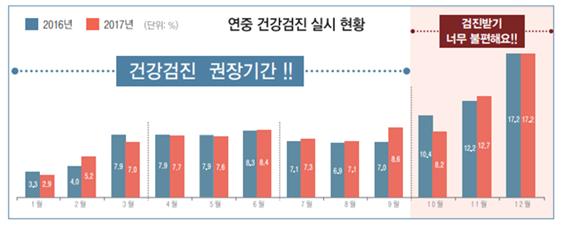
Let's learn more about general health checkups

This year, those eligible for the general health checkup are those who are 20 years of age or older and born in odd-numbered years. It is easy to memorize that in odd-numbered years, those born in odd-numbered years, and in even-numbered years, those born in even-numbered years are eligible. There are exceptions, and non-office workers are required to undergo annual check-ups.
What is the procedure for a general health checkup?
General health checkups are completely free of charge. In the case of local subscribers, they will be notified to the address listed in their resident registration, and in the case of workplace subscribers, they will be notified to go to the company for a medical examination. When you make an appointment at a designated medical institution and visit the hospital, you will be examined for the following items:
Results will be mailed to you. It will be sent within 15 days to the address indicated on the questionnaire completed by the institution where the examination was performed.
Interpreting the Examination Results
In the 'Comprehensive Findings of Medical Examination' section, comprehensive findings are displayed. They are classified as 'Normal A', 'Normal B', 'Suspected General Disease', 'Suspected Hypertension or Diabetes Disease (Subject to Confirmed Examination)', and 'Symptomatic Person'.
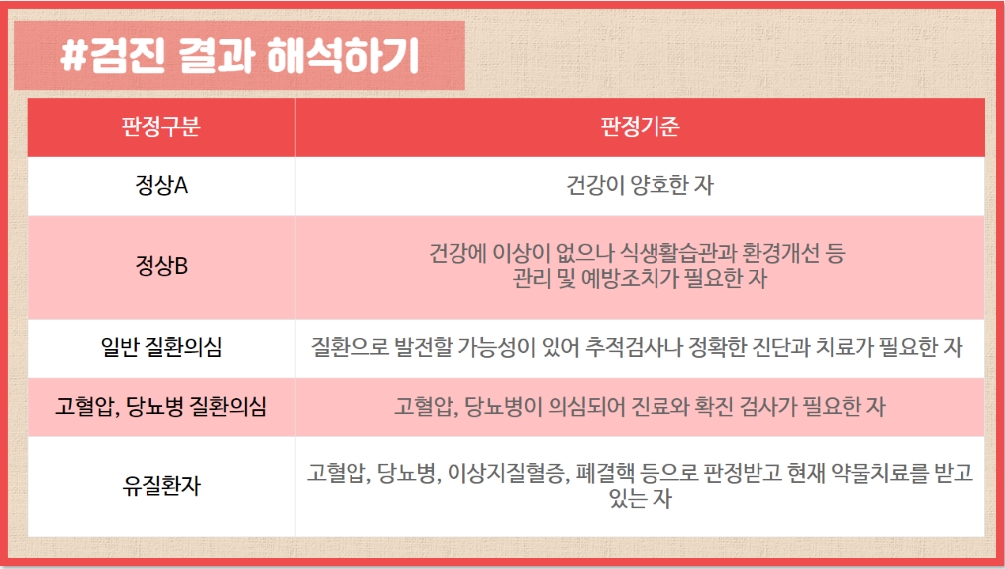
On the other hand, the normal level that can be compared with the results of each test item is also written down, so you can know what kind of condition you have.
Let's learn more about the National Cancer Screening
In addition to general screening, there is also a national cancer screening program that is 90% funded by the government.
The national cancer screening is for six major cancers (stomach cancer, colorectal cancer, liver cancer, breast cancer, cervical cancer, and lung cancer) that are more common in the Korean people, have early diagnosis methods, and can be treated.
Early diagnosis of cancer is important because the five-year survival rate varies greatly depending on the time of diagnosis. The National Cancer Screening is a good opportunity to diagnose the six major cancers at an early stage.
However, as of 2017, only 50% of all people eligible for free cancer screenings actually benefited. Let's take a closer look at the cancer screening business with Biondu and don't miss out on it in 2019.
[Colorectal Cancer]
If you are an adult over the age of 50, you can have a fecal occult blood test every year. (1) If there is a response to fecal occult blood testing, and (2) a colonoscopy should be performed.
In the past, students were asked to choose between contrast examination and endoscopy, but since 2018, it has been recommended that endoscopy with high accuracy be performed first. If colonoscopy is difficult, a colonoscopy can be substituted.
<Things to watch out for>
If you violate the order and have a colonoscopy without having a fecal occult blood test, you will have to pay the full cost of the test.
<Inspection Fee>
If you follow the order, the National Health Insurance Corporation will cover the entire cost of the checkup, and it is free of charge. However, if you perform an examination other than the prescribed items, such as sleep endoscopy, you may incur a co-payment.
[Stomach Cancer]
If you are an adult over the age of 40, you can have a gastroscopy every two years (1). If gastroscopy is difficult, gastroscopy may be an option. If cancer is suspected as a result of the test, (2) a biopsy will be performed.
<cost>
You have to pay 10% of the cost of stomach cancer screening. For those who have undergone medical examination and gastroscopy, the out-of-pocket expense is around 7,300 won. As with colorectal cancer screening, there may be additional costs for tests other than those specified.
[Liver Cancer]
Liver cancer is only screened for people over the age of 40 and those who are at high risk. The high-risk group is ▲liver cirrhosis, ▲hepatitis B virus antibody positive, ▲hepatitis C virus antibody positive, and ▲chronic liver disease caused by hepatitis B or C virus.
If you are in a high-risk group, you will have liver ultrasound twice a year (once each in the first half and once in the second half) and a serum alpha-fetoprotein test (blood test).Hepatitis carriers who have been diagnosed separately in addition to the public health checkup can continue to be screened for liver cancer if they submit the test results to the public corporation.
<cost>
The out-of-pocket fee, which is 10% of the total cost of the checkup, is around 10,000 won.
[breast cancer]
Women over the age of 40 can have a mammogram every two years. Mammography is the most basic screening method for detecting asymptomatic early breast cancer. It can be accompanied by pain due to breast compression.
<cost>
As with liver cancer, there is a 10% out-of-pocket cost, which is around 4,500 for consultation and mammography combined.
[Cervical Cancer]
Cervical cancer screening is for women over 20 years of age.
<Things to watch out for>
Cervical smear is done every two years, and it is recommended that people who have had a hysterectomy or have no sexual experience consult their examining physician before the test.
<cost>
Cervical cancer screening is fully funded, so there are no out-of-pocket costs.
Except for cervical cancer and colorectal cancer, the other three major cancers that are subject to national cancer screening incur 10% of the out-of-pocket expenses. However, there are exceptions. Those whose health insurance premiums are below the threshold are eligible for full assistance. According to an official from the Occupational Health Division of the Ministry of Health and Welfare, insurance premiums are 93,000 won or less for workplace subscribers, and 94,000 won or less for local subscribers.
[lung cancer]
Lung cancer is a new carcinoma that was added this year.
From July this year, people aged 54~74 with a smoking history of 30 packs or more (smoking 1 pack of cigarettes every day for 30 years or 2 packs of cigarettes every day for 15 years) can be screened for lung cancer through low-dose lung CT every 2 years.
In particular, low-dose chest CT, which is taken with a reduced radiation dose compared to conventional CT, can detect early lung cancer without symptoms that are difficult to detect with X-rays. Low-dose lung CT has only one-fifth the radiation dose compared to regular CT, so there is less concern about radiation exposure.
<cost>
Of the lung cancer screening cost, which is about 110,000 won per person, the out-of-pocket ratio is 10%, and the remaining 90% is covered by health insurance. The deductible is about 10,000 won. The bottom 50% of households and medical benefit recipients do not have to pay out-of-pocket expenses.
Finally, let's take a look at two reasons why you should go for a general health checkup and a national cancer screening.
First, if the employee does not take the general health checkup on time, he or she will be fined.
According to the Occupational Safety and Health Act, employers (companies) must require workers to undergo medical examinations. It applies once every two years for white-collar workers and every year for non-white-collar workers. If this is violated, the company shall pay a fine of 50,000 won for one violation, 100,000 won for the second violation, and 150,000 won for the third violation.
However, if there is evidence that the company has repeatedly encouraged the employee to undergo a medical examination, and the supervisor admits to this, the penalty may be passed on to the employee.
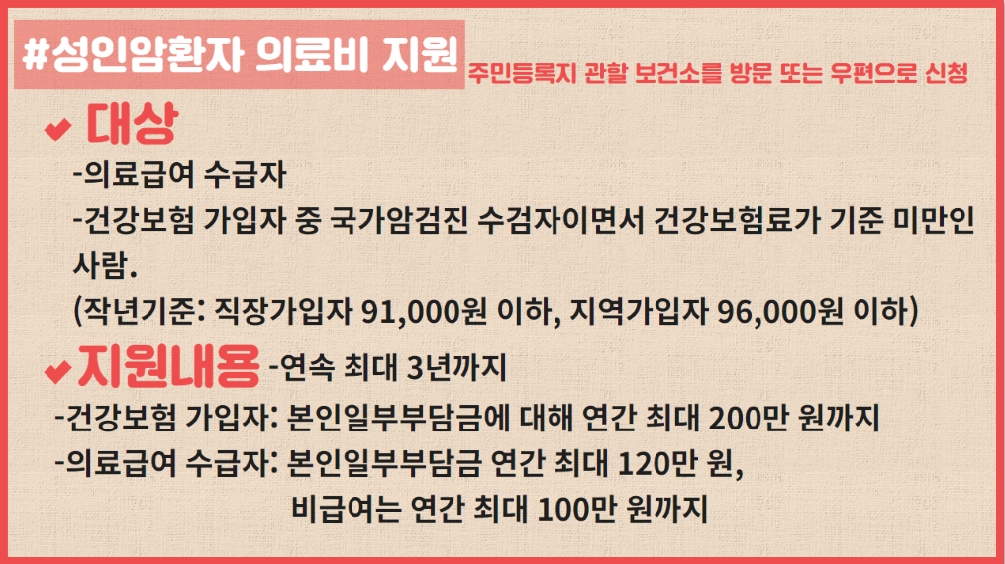
Second, if you are diagnosed with cancer through the national cancer screening, you can receive up to 2 million won per year from the state.
There is a rumor that people who do not get regular health checkups and cancer screenings on time will not be covered by health insurance, but this is wrong. Even if you don't get the national cancer screening on time, you can still get the same health insurance benefits. Currently, those who are registered as cancer patients under the National Health Insurance (NHI) will be covered by the National Health Insurance Corporation for 95% of their treatment costs for five years, so they only have to pay 5% out of pocket.
There are two disadvantages to those who do not undergo general health checkups and cancer screenings.
The first is the penalty imposed on the above-mentioned businesses, and the second is that they will not be able to receive medical expenses for cancer patients.
The Cancer Patient Medical Expense Project is a system that supports medical expenses of up to 2 million won per person per year for those who have been diagnosed with one of the six major cancers through the National Cancer Screening Project among health insurance subscribers.
As of last year, health insurance premiums must be less than 91,000 won for employees and 96,000 won or less for local subscribers. Since the health insurance premiums for January of the year of the cancer diagnosis are based on the standard, the base amount will be different this year, but it has not yet been announced. The exact amount will be confirmed at a later date.
If you are dissatisfied with the general health checkup and the national cancer screening process, or have any questions, you can file an appeal with the nearest branch office or leave a message on the website of the National Health Insurance Corporation, "I Have a Word". (Awakening information - Even after the rain, there is a "I have a word". As a reader or viewer, as a patient or medical consumer, you can leave your opinion)



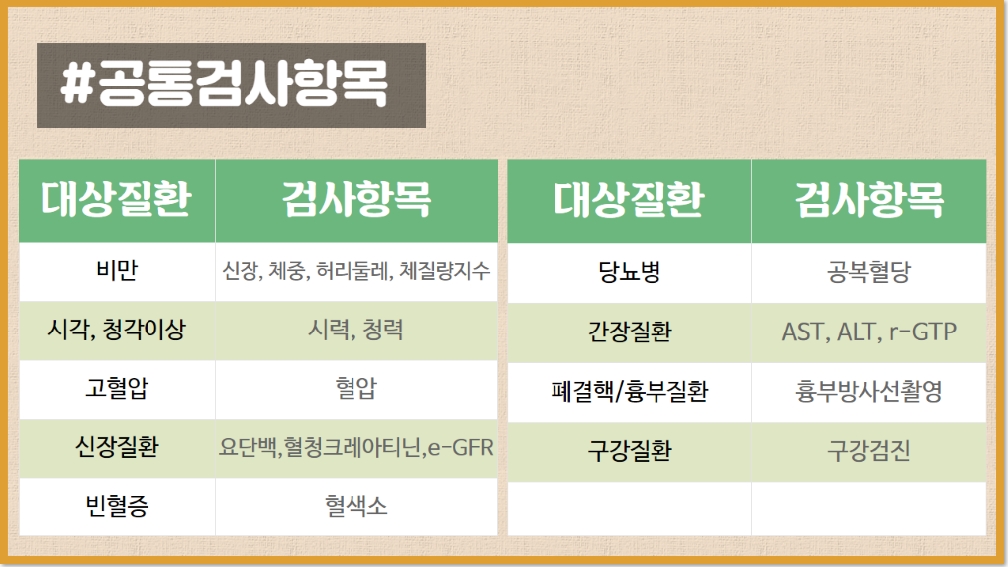
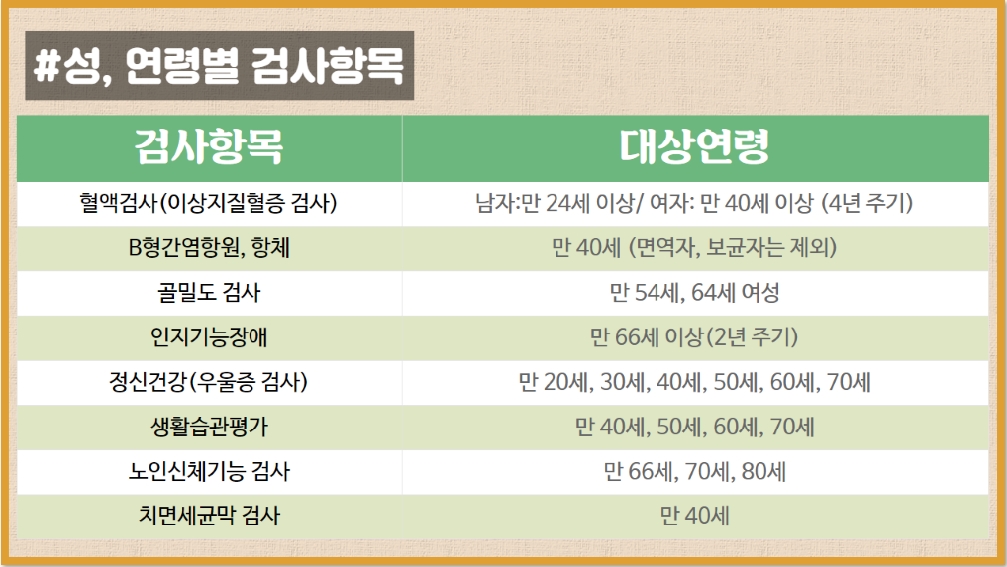


Comments (0)
There are no comments for this article. Be the first one to leave a message!